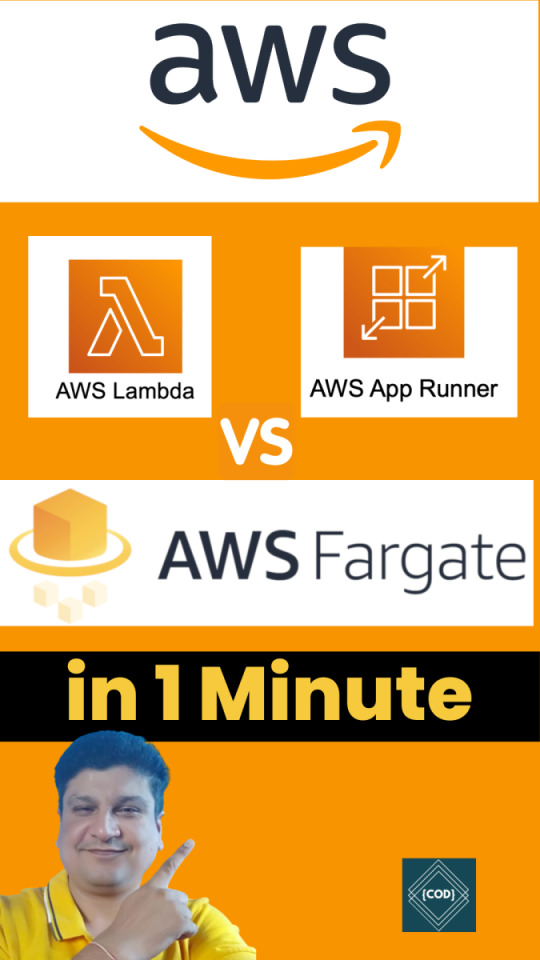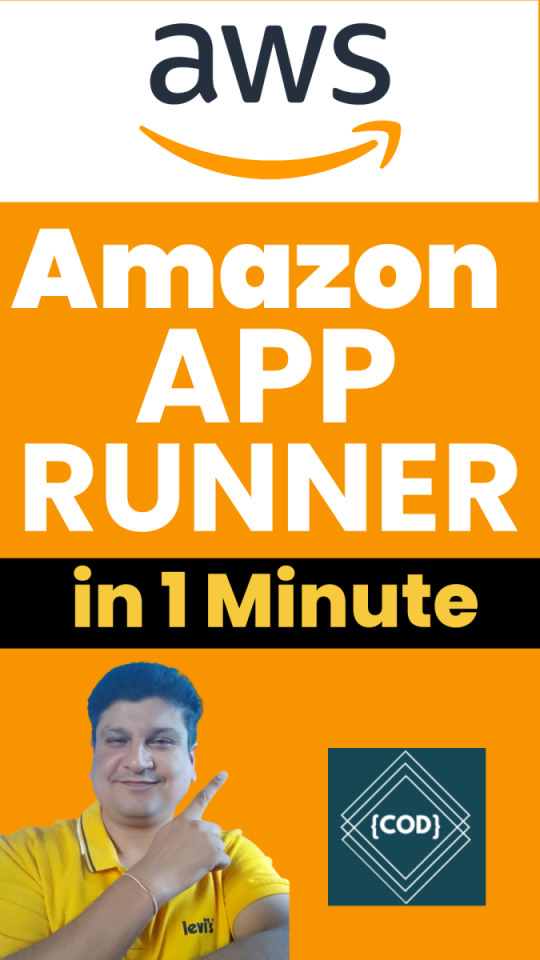#aws apprunner
Explore tagged Tumblr posts
Text
#aws cloud#aws ec2#aws s3#aws serverless#aws ecs fargate tutorial#aws tutorial#aws cloud tutorial#aws course#aws cloud services#aws apprunner#aws rds postgres
0 notes
Text
Cloud Providers Compared: AWS, Azure, and GCP
This comparison focuses on several key aspects like pricing, services offered, ease of use, and suitability for different business types. While AWS (Amazon Web Services), Microsoft Azure, and GCP (Google Cloud Platform) are the “big three” in cloud computing, we will also briefly touch upon Digital Ocean and Oracle Cloud.
Launch Dates AWS: Launched in 2006 (Market Share: around 32%), AWS is the oldest and most established cloud provider. It commands the largest market share and offers a vast array of services ranging from compute, storage, and databases to machine learning and IoT.
Azure: Launched in 2010 (Market Share: around 23%), Azure is closely integrated with Microsoft products (e.g., Office 365, Dynamics 365) and offers strong hybrid cloud capabilities. It’s popular among enterprises due to seamless on-premise integration.
GCP: Launched in 2011 (Market Share: around 10%), GCP has a strong focus on big data and machine learning. It integrates well with other Google products like Google Analytics and Maps, making it attractive for developers and startups.
Pricing Structure AWS: Known for its complex pricing model with a vast range of options. It’s highly flexible but can be difficult to navigate without expertise. Azure: Often considered more straightforward with clear pricing and discounts for long-term commitments, making it a good fit for businesses with predictable workloads.
GCP: Renowned for being the most cost-effective of the three, especially when optimized properly. Best suited for startups and developers looking for flexibility.
Service Offerings AWS: Has the most comprehensive range of services, catering to almost every business need. Its suite of offerings is well-suited for enterprises requiring a broad selection of cloud services.
Azure: A solid selection, with a strong emphasis on enterprise use cases, particularly for businesses already embedded in the Microsoft ecosystem. GCP: More focused, especially on big data and machine learning. GCP offers fewer services compared to AWS and Azure, but is popular among developers and data scientists.
Web Console & User Experience AWS: A powerful but complex interface. Its comprehensive dashboard is customizable but often overwhelming for beginners. Azure: Considered more intuitive and easier to use than AWS. Its interface is streamlined with clear navigation, especially for those familiar with Microsoft services.
GCP: Often touted as the most user-friendly of the three, with a clean and simple interface, making it easier for beginners to navigate. Internet of Things (IoT)
AWS: Offers a well-rounded suite of IoT services (AWS IoT Core, Greengrass, etc.), but these can be complex for beginners. Azure: Considered more beginner-friendly, Azure IoT Central simplifies IoT deployment and management, appealing to users without much cloud expertise.
GCP: While GCP provides IoT services focused on data analytics and edge computing, it’s not as comprehensive as AWS or Azure. SDKs & Development All three cloud providers offer comprehensive SDKs (Software Development Kits) supporting multiple programming languages like Python, Java, and Node.js. They also provide CLI (Command Line Interfaces) for interacting with their services, making it easy for developers to build and manage applications across the three platforms.
Databases AWS: Known for its vast selection of managed database services for every use case (relational, NoSQL, key-value, etc.). Azure: Azure offers services similar to AWS, such as Azure SQL for relational databases and Cosmos DB for NoSQL. GCP: Offers Cloud SQL for relational databases, BigTable for NoSQL, and Cloud Firestore, but it doesn’t match AWS in the sheer variety of database options.
No-Code/Low-Code Solutions AWS: Offers services like AWS AppRunner and Honeycode for building applications without much coding. Azure: Provides Azure Logic Apps and Power Automate, focusing on workflow automation and low-code integrations with other Microsoft products.
GCP: Less extensive in this area, with Cloud Dataflow for processing data pipelines without code, but not much beyond that. Upcoming Cloud Providers – Digital Ocean & Oracle Cloud Digital Ocean: Focuses on simplicity and cost-effectiveness for small to medium-sized developers and startups. It offers a clean, easy-to-use platform with an emphasis on web hosting, virtual machines, and developer-friendly tools. It’s not as comprehensive as the big three but is perfect for niche use cases.
Oracle Cloud: Strong in enterprise-level databases and ERP solutions, Oracle Cloud targets large enterprises looking to integrate cloud solutions with their on-premise Oracle systems. While not as popular, it’s growing in specialized sectors such as high-performance computing (HPC).
Summary AWS: Best for large enterprises with extensive needs. It offers the most services but can be difficult to navigate for beginners. Azure: Ideal for mid-sized enterprises using Microsoft products or looking for easier hybrid cloud solutions. GCP: Great for startups, developers, and data-heavy businesses, particularly those focusing on big data and AI. To learn more about cloud services and computing, Please get in touch with us
0 notes
Text
Does DNS resolution not work in AWS App Runner?
If you don’t know what AWS App Runner, it’s a really easy way to deploy Docker apps without all the messy nonsense of an ECS cluster. You point it to an ECR image, tell it the port, and you’re off! It’ll even deploy new versions of your image when they’re pushed... for $1/month/app(?).
Anyway. I have a UI built with Next.JS (sidenote: I clearly don’t understand SPA development these days, because Next needs a Node server??) To avoid CORS issues calling the API directly, I opted to use Next’s redirect functionality as a sort of reverse proxy. It worked in a local instance pointing to the deployed API.
When I deployed it to App Runner, it looked like the API calls were all being resolved to localhost, instead of the fully-qualified URL I had hard-coded. This, of course, resulted in a connection error, because nothing else was running on that image. Even if I changed it to something like Google, it would resolve to localhost.
I gave up trying to resolve this and am instead getting into the messy nonsense of an ECS deployment...
Update 12/27: More proof
I setup Auth0 for my app, and it worked great locally. When I deployed it, I got the following when the Auth0 client attempted to pull down the JWKS list:
requests.exceptions.ConnectionError: HTTPSConnectionPool(host='dev-p1j473ay.us.auth0.com', port=443): Max retries exceeded with url: /.well-known/jwks.json (Caused by NewConnectionError('<urllib3.connection.HTTPSConnection object at 0x7fcfbf9b7eb0>: Failed to establish a new connection: [Errno -3] Temporary failure in name resolution')) 12-27-2021 03:35:30 PM raise ConnectionError(e, request=request)
There don’t appear to be any VPC settings on App Runner, so I���m not sure where to go from here.
0 notes
Text
Difference between AWS Lambda, App Runner & Fargate Service in AWS | Compare Serverless Services in Amazon Cloud
Full Video Link https://youtube.com/shorts/yEcrEEVNZJg Hi, a new #video on difference between #lambda vs #apprunner vs #fargate in #aws #cloud is published on #codeonedigest #youtube channel. @java @awscloud @AWSCloudIndia @YouTube #youtube @codeo
Let learn the difference between AWS Lambda, App Runner & Fargate serverless compute services available in amazon cloud. Concurrency lambda – Single concurrent request per Lambda function instance, but many separate Lambda function instances.App Runner – Multiple concurrent requests per container, enforces a configurable hard limit such as 100 concurrent reqs/container. Fargate – Multiple…

View On WordPress
0 notes
Video
youtube
Setup AWS APP Runner Service | Deploy Nodejs JavaScript API in Amazon AP... Full Video Link - https://youtu.be/7IdChQYQmm4 Hi, a new #video to setup #awsapprunner #apprunner & #run #deploy #nodejs #javascript #api in #amazon app runner #service published on #codeonedigest #youtube channel. @java @awscloud @AWSCloudIndia @YouTube @codeonedigest #awsecs #nodejs #dockerimage #aws #awsapprunner #amazonwebservices #awscloud #awstutorial #awstraining #awsapprunnertutorial #awsapprunnerdemo #awsapprunnerdocker #awsapprunnerexample #awsapprunnerreview #apprunnertutorial #apprunnervsfargate #apprunnerterraform #apprunnervselasticbeanstalk #apprunnercustomdomaincloudformation #nodejstutorial #nodejsapitutorial #nodejsapiproject #nodejsapidevelopment #nodejsawsinterviewquestions #deploynodejsapp #api
#youtube#aws#aws app runner#amazon app runner#node js api#app runner in aws#app runner serverless#app runner vs fargate#fargate vs app runner
1 note
·
View note
Text
AWS APP Runner Tutorial for Amazon Cloud Developers
Full Video Link - https://youtube.com/shorts/_OgnzyiP8TI Hi, a new #video #tutorial on #apprunner #aws #amazon #awsapprunner is published on #codeonedigest #youtube channel. @java @awscloud @AWSCloudIndia @YouTube #youtube @codeonedigest #code
AWS App Runner is a fully managed container application service that lets you build, deploy, and run containerized applications without prior infrastructure or container experience. AWS App Runner also load balances the traffic with encryption, scales to meet your traffic needs, and allows to communicate with other AWS applications in a private VPC. You can use App Runner to build and run API…

View On WordPress
#amazon web services#amazon web services tutorial#app runner#app runner tutorial#app runner vs fargate#aws#aws app runner#aws app runner demo#aws app runner docker#aws app runner equivalent in azure#aws app runner example#aws app runner review#aws app runner spring boot#aws app runner tutorial#aws app runner youtube#aws cloud#aws cloud services#aws cloud tutorial#aws developer tools#aws ecs fargate#aws tutorial beginning#what is amazon web services
0 notes